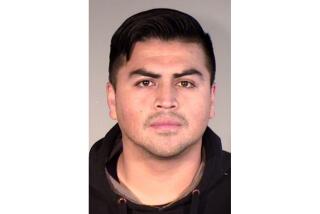‘Revenge porn’ conviction is a first under California law

Three years ago, Noe Iniguez and his girlfriend broke up. That’s when he decided to get even, prosecutors said.
He posted a topless photograph of his ex-girlfriend on her employer’s Facebook page along with messages calling her a “drunk” and a “slut” and encouraging her firing, they said.
Until recently, his actions would have been outside the reach of the law, because victims were not offered protection from people who intentionally posted their nude photographs without their consent.
That changed when a new law took effect in October 2013, making Iniguez’s actions a misdemeanor crime.
This week, he became the first person in California to be convicted for “revenge porn” and was sentenced to a year in jail.
“We are breaking ground in California on an issue that is affecting people around the country, in particular, women,” state Atty Gen. Kamala Harris told The Times.
The state created an eCrime Unit dedicated to tackling technology crime, which includes “revenge porn.” For it to be considered a crime requires a person to intentionally and publicly distribute unauthorized nude photos knowing that they will cause emotional distress.
“It really is a cowardly act,” Harris said.
California is one of 13 states that have enacted cyberexploitation laws, and Harris’ office is now prosecuting the first criminal cases in the country against operators of cyberexploitation websites.
One of those cases involves Casey Meyering, who is charged with extorting victims whose computers were hacked and their nude photos posted on his website Winbystate.com. Meyering, whose trial is expected to start Dec. 15, is accused of charging victims $250 for removing the photographs.
The American Civil Liberties Union had for the most part opposed the bill. In September 2013, the group said “the speech must constitute a true threat or violate another otherwise lawful criminal law, such as stalking or harassment statute, in order to be made illegal.”
On Wednesday, the ACLU said it is remaining neutral on the conviction.
Harris said she has a problem with the term “revenge porn,” saying that it suggests consent and that the perpetrators were vengeful ex-lovers, which is not always the case. Cyber exploitation, Harris said, is a more accurate term to describe the crime.
Charlotte Laws hopes for a conviction when her daughter’s case against a website publisher goes to trial in March. That federal trial involves Hunter Moore, the revenge-porn publisher of the now-defunct website “Is Anyone Up?”
Her daughter was targeted not by an ex-boyfriend in 2011 but by hackers, who infiltrated her computer; her nude photos wound up appearing on Moore’s website.
Laws became obsessed with removing her daughter’s photos from the website and eventually sought the help of the FBI, which later arrested Moore, of Woodland in Northern California, and Charles Evens of Studio City in January 2014, accusing them of hacking into email accounts and stealing sexually explicit photos to put on the website.
They were charged with conspiracy, identity theft and unauthorized access to a protected computer to obtain information.
Moore, who was dubbed the “king of revenge porn” by many, later told a Times reporter who asked about those who wanted their photos removed: “I understand it can hurt your reputation, and your job and yadda yadda yadda.”
Mary Anne Franks, an associate professor of Law at the University of Miami, said California’s revenge-porn law still needs work.
“The law is still not perfect; for instance, it requires that the victim demonstrate that she suffered serious emotional distress, which is unnecessary, burdensome and potentially requires the victim to expose even more of her private life to the public eye,” she said.
Many perpetrators, she said, are not motivated by the intent to cause harm or emotional distress.
One recent example occurred in the Bay Area community of Dublin, when a California Highway Patrol officer said fellow officers traded nude photographs of women they stopped as part of widespread game.
Some critics of the law contend that even if distressing, posted material that could be considered revenge porn is constitutionally protected.
Franks, who is also vice president of the nonprofit anti-online-harassment organization Cyber Civil Rights Initiative, said she believes a federal criminal law protecting sexual privacy is the strongest solution to preventing cyberexploitation.
Still, she said, California’s conviction is a rarity at a time when many victims are reluctant to come forward and risk further exposure.
“Perpetrators of nonconsensual pornography seek to deprive people of their fundamental right to control access to their own bodies, and they will continue to do so as long as they believe they can do so with impunity,” she said.
More to Read
Sign up for Essential California
The most important California stories and recommendations in your inbox every morning.
You may occasionally receive promotional content from the Los Angeles Times.










